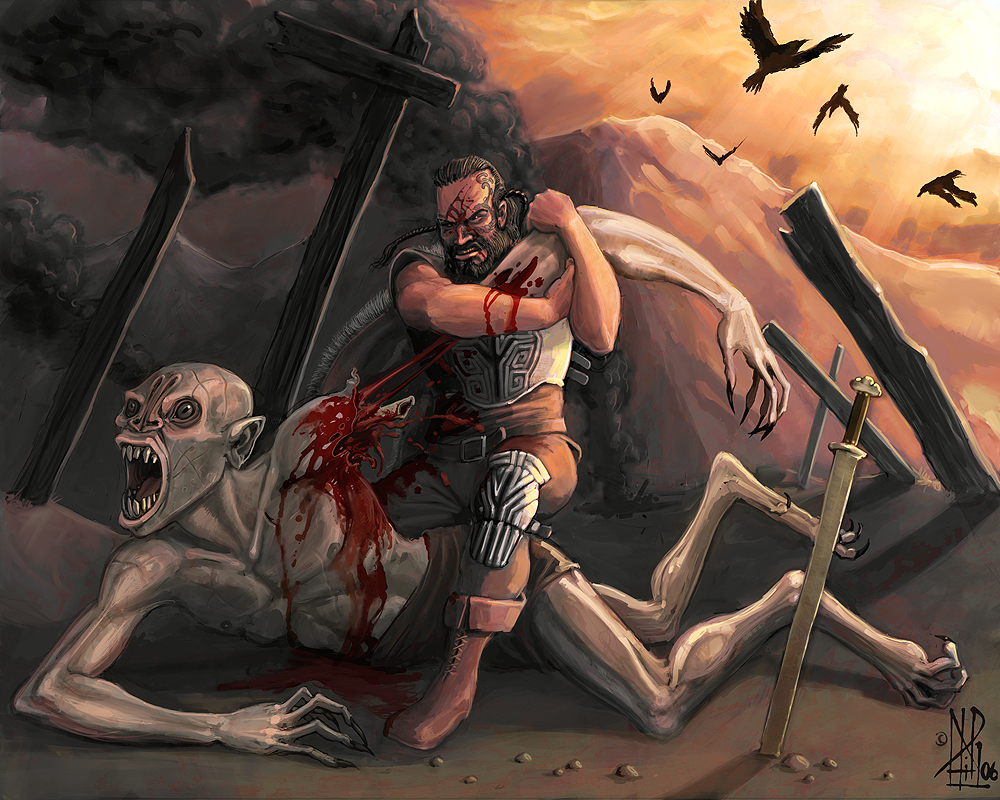I’m very intrigued by the definition of a monster. The
Oxford Dictionary describes a monster
as:
Something
extraordinary or unnatural; a malformed animal or plant; a fetus, neonate, or
individual with a gross congenital malformation, usually of a degree
incompatible with life; a person of repulsively unnatural character, or
exhibiting such extreme cruelty or wickedness as to appear inhuman; a monstrous
example of evil, a vice, etc.; an ugly or deformed person, animal, or thing.
In the epic poem Beowulf,
Grendel easily fits this definition. Grendel is described as “a powerful demon”
(86), “a fiend out of hell” (100), and “[dwells] in misery among the banished
monsters, Cain’s Clan, whom the Creator had outlawed and condemned as outcasts”
(106-107).
Every description in Beowulf seems to focus on Grendel’s
character, not his appearance. There is no description of what he looks like,
only how he acts. He acts a fiend, he is God-cursed, and he is a miserable
wretch. Not once does it say if he is covered in hair, lumpy or bumpy, or a
creepy creature. He is a monster to these people because of his inhuman
actions. Because he dwells in the bogs and murders and eats people he is a
monster; which fits the Oxford definition “exhibiting extreme cruelty or
wickedness.”

I like this idea of Grendel as a monster not because of how he was born, but because of his actions. Like a wise old wizard once said, "It matters not what someone is born, but what they grow to be." And for Grendel, that seems to be true.
ReplyDelete...or a monster because of how he is treated, perhaps?
DeleteI tend to think of G more as a man than a monster. But of course, humans have the capacity to be monstrous, as history has more than adequately demonstrated for us!
(I sized your image down because it was so big it sprawled outside the borders of the blog! My browser just couldn't handle all that gore, I suppose??
ReplyDeleteI think the struggle to figure out if Grendel is a man or a monster is an interesting one. Because if he was simply a man, I don't know if it would have been as acceptable for Beowulf to murder him. If he is considered a monster then he loses all of his humanity, and killing a monster is doing the Kingdom a service. I feel like we are made to believe he is a monster because that's how Beowulf and the men in the mead hall see him, and we are getting this story from their perspective. I'm sure if this book was called "Grendel's Mom" and we were seeing it from her eyes, Grendel wouldn't seem too monstrous at all.
ReplyDeleteI think the struggle to figure out if Grendel is a man or a monster is an interesting one. Because if he was simply a man, I don't know if it would have been as acceptable for Beowulf to murder him. If he is considered a monster then he loses all of his humanity, and killing a monster is doing the Kingdom a service. I feel like we are made to believe he is a monster because that's how Beowulf and the men in the mead hall see him, and we are getting this story from their perspective. I'm sure if this book was called "Grendel's Mom" and we were seeing it from her eyes, Grendel wouldn't seem too monstrous at all.
ReplyDelete